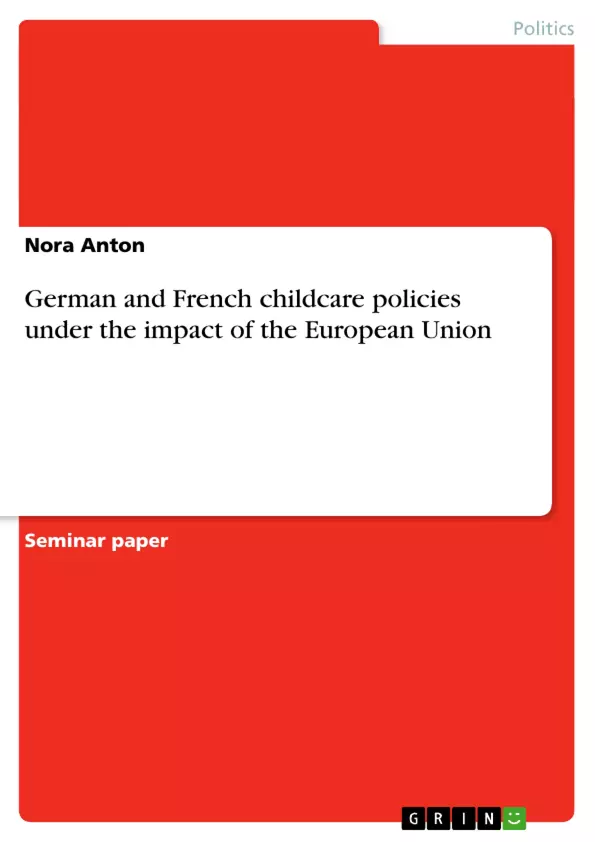In most European societies, it is women who are considered responsible for raising children and caring for dependent family members, whereas men’s task is to cater for the family financially. On the one hand, this prevents mothers from participating actively in the labour market, while on the other hand, it gives fathers little time to spend with their children. Traditionally, national welfare states have regulated this kind of inequality in accordance with society’s norms and values, by providing a framework of services (e.g. public childcare facilities), monetary transfers (child-rearing benefits), and leave regulations (parental leave), thus creating incentives and disincentives for mothers (and fathers) to work and/or to look after the children at home. National arrangements vary considerably across the different states, whether they be geographically and culturally close or remote, whether they belong to the same or to a different welfare state regime. A good example for such differences are child-care arrangements in Germany and France. Although neighbours and both conservative-corporatist welfare states, they have developed very different approaches in dealing with the problem of labour market participation of women with children.
In the past 20 years, welfare states, and with them family policies, have faced considerable pressures of different types. External as well as internal changes have played a role here. Macroeconomic changes have brought about a need for states to increase their competitiveness in order to combat rising unemployment, cutting down or restructuring social welfare. Moreover, attitudes towards childcare have changed, with women increasingly wanting to take up work. Another type of pressure arose with European integration. With the EU, a new player has emerged to interfere with the design of family policies in the Member States, especially after recognising that competition and market integration alone do not automatically lead to social justice.
Inhaltsverzeichnis (Table of Contents)
- INTRODUCTION
- PRESSURES TOWARDS CONVERGENCE
- CHILDCARE POLICIES IN GERMANY AND FRANCE
- Historical and ideological backgrounds
- Service and monetary provisions and parental leave arrangements
- EU CHILDCARE POLICIES
- EU childcare policies up to 1998
- OMC in European childcare policies 1998-2005
- CONCLUSION: CONVERGENCE OR DIVERGENCE?
Zielsetzung und Themenschwerpunkte (Objectives and Key Themes)
This research paper investigates the potential convergence of German and French childcare policies, analyzing the influence of European Union policies on national family arrangements. The study examines the pressures towards convergence, existing childcare frameworks in Germany and France, and the role of EU childcare policies in shaping national approaches.
- The impact of European Union policies on national childcare frameworks.
- The role of historical and ideological factors in shaping childcare policies in Germany and France.
- The influence of gender roles and women's participation in the labor market on childcare policies.
- The comparison of childcare provision, monetary benefits, and parental leave arrangements in Germany and France.
- The analysis of convergence and divergence trends in childcare policies across the two countries.
Zusammenfassung der Kapitel (Chapter Summaries)
- Introduction: This chapter sets the stage for the study, outlining the historical and contemporary context of childcare policies in Germany and France. It highlights the traditional gender roles, the need for women's participation in the workforce, and the pressures faced by welfare states in the face of globalization and changing societal norms.
- Pressures towards convergence: This chapter explores the factors driving potential convergence in childcare policies, including increasing female labor market participation, the influence of feminist movements, and shifting welfare and labor market priorities.
- Childcare Policies in Germany and France: This chapter delves into the specific childcare arrangements in Germany and France, examining their historical and ideological backgrounds, service and monetary provisions, and parental leave arrangements.
- EU Childcare Policies: This chapter analyzes the evolution of European Union childcare policies, focusing on their development up to 1998 and the impact of the European Employment Strategy since then. It examines the role of common guidelines, national action plans, and recommendations in shaping national childcare policies.
Schlüsselwörter (Keywords)
The key terms and concepts explored in this research paper include childcare policies, convergence, divergence, European Union, Germany, France, gender roles, labor market participation, welfare state, social justice, feminist thought, and European Employment Strategy.
Frequently Asked Questions
How do German and French childcare policies differ traditionally?
Despite both being conservative-corporatist welfare states, they have historically developed very different approaches to female labor market participation and childcare provision.
What role does the European Union play in national childcare policies?
The EU acts as a catalyst for convergence by introducing common guidelines, recommendations, and the European Employment Strategy to promote social justice and market integration.
What is the Open Method of Coordination (OMC) in this context?
The OMC is a policy-making process used by the EU to influence national childcare frameworks between 1998 and 2005 through non-binding goals and shared best practices.
Are gender roles changing in these societies?
Yes, increasing female labor market participation and feminist movements have pressured welfare states to restructure parental leave and childcare services.
Does the study conclude that policies are converging?
The research analyzes whether the external pressures from the EU and macroeconomic changes are leading to a convergence of the previously distinct German and French models.
- Quote paper
- Nora Anton (Author), 2006, German and French childcare policies under the impact of the European Union, Munich, GRIN Verlag, https://www.grin.com/document/85365



